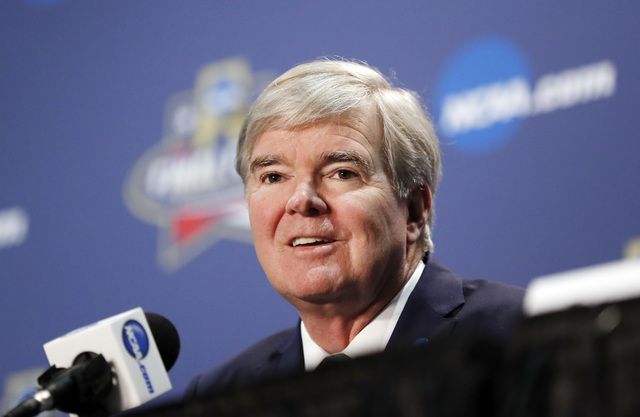Click here to subscribe today or Login.
NEW YORK — NCAA President Mark Emmert says he is pleased to see how well Penn State’s football team has bounced back from the sanctions the program received in 2012 after the Sandusky scandal.
No. 5 Penn State (11-2) is having its best season since Jerry Sandusky, a longtime assistant of late Nittany Lions coach Joe Paterno, was arrested in 2011 for sexually abusing boys. The Nittany Lions won their last nine games and the Big Ten title.
“I think it’s terrific,” said Emmert, who spoke at an intercollegiate athletics forum sponsored by Learfield Communications on Wednesday in Manhattan.
“I think what Penn State went through is an awful situation and it’s still playing out sadly. But the football program is still Penn State and they showed it and they did really well. The university has done an amazing job to put in place all of the things their board wanted and our board wanted.”
The NCAA went outside its usual process to sanction Penn State in 2012. The school was hit with massive scholarship limitations and a four-year bowl ban, along with fines. The school also agreed to enact dozens of reforms recommended in a report by former FBI director Louis Freeh on the scandal.
The original scholarship and postseason penalties were eventually rolled back. Emmert said he was pleased the roll back helped Penn State recover more quickly, and that NCAA sanctions are not meant to cripple an athletic program.
“I’ve always said and always believed that Penn State first and foremost is a great university … and secondly it’s got wonderful sports traditions. How could you not be pleased that they’re playing good football again? That’s very good stuff,” he said.
Emmert covered numerous topics in a 30-minute question-and-answer session, and after he spoke with group of reporters for 15 more minutes.
• He declined to weigh in on whether the College Football Playoff selection committee made the right decision with the four teams it chose to compete for the national championship, but he did say he would prefer an eight-team playoff that would include automatic bids for the Power Five conference champions.
“I think a conference championship ought to count for something. I think how you determine your champion is up to somebody else,” Emmert said. “I’d like to see all five of the conference champions get in the playoff.”
The NCAA has no authority over the College Football Playoff.
“That’s why we live in America. Everybody can have an opinion,” Big Ten Commissioner Jim Delany joked, when asked about Emmert’s comments. “He doesn’t have a vote, though.”
• Emmert said he would like to see the new NCAA football oversight committee better define the purpose of bowl games. There are 40 and some spots are given to teams with sub.-500 records. The NCAA does not run bowl games. It does have a sanctioning process, but mostly it lets conferences decide whether they want to put on games.
“What do we, the membership of intercollegiate athletics, want bowl games to be?” Emmert said. “Are they a 13th game that’s an exhibition game? Are they a reward for having won something? We have teams in now that can get into a bowl game having won two or three of their conferences games.”
• The NCAA pulled its championship events out of North Carolina in September because of a state law that limits anti-discrimination protections for LGBT people. The decision was later criticized by Notre Dame President Rev. John Jenkins in an Wall Street Journal op-ed. Jenkins said the NCAA should not be a moral arbiter.
“He and I have chatted a lot about that issue, and obviously I disagree and obviously, more importantly the board of governors disagreed,” Emmert said.
The NCAA will choose sites for future championship events in April and part of that is a “fairly complex process,” Emmert said, of looking at the local and state laws of potential host locations.
“One of the considerations we have now as we make those decisions, as the sport committees make decisions about where they go, is going to be LGBT rights,” he said. “I think and hope and believe, maybe wishfully, that North Carolina will modify their position because citizens want that.”
• Emmert said the Big 12 deciding not to expand was a “good thing for college sports.”
“I think the last round was very disruptive. It had a negative impact on so many schools, even personal relationships. It was hard and I’m glad we didn’t have to go through that again. Even on a smaller scale,” Emmert said.





